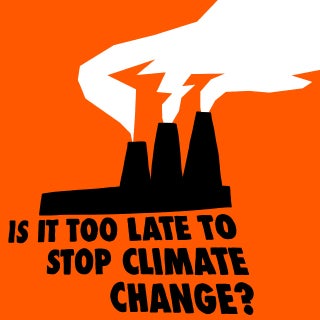Episode four
Is it too late to stop climate change?
In the fourth episode of our podcast, we debate whether people should be optimistic about preventing a climate disaster.

Rashida Jones isn’t very optimistic about climate change. She’s not alone. Lots of people are skeptical about our ability to prevent a climate disaster—but I’m not one of them. In the latest episode of our podcast, I tried to convince Rashida that there’s hope for the future of our planet if we take the right steps. Our fourth episode is all about a question with massive implications: is it too late to stop climate change?

Climate change is the most daunting challenge of our time. Tackling it will require unprecedented amounts of innovation, investment, and global cooperation. Are we actually making progress yet? Can we really stop the worst effects of climate change? In this week’s episode, Bill and Rashida take on perhaps their biggest question yet with an assist from Pulitzer Prize-winning author Elizabeth Kolbert.
I’ve written a lot about why I think we can avoid the worst effects of climate change here on this blog (and in my upcoming book). But the reality is that, even if we do all the right things and prevent a disaster scenario, we’re already seeing the effects of climate change.
When I talk about the impacts of climate change, I usually focus on how it will affect people. Our guest this week is Elizabeth Kolbert, who has a deep understanding of how a changing planet is also hurting animals, plants, and even entire ecosystems. She’s been writing about climate change for the New Yorker for the last two decades. I loved her first book, The Sixth Extinction, and I was excited to hear that she’s working on a follow-up that will be released in the spring.
Rashida and I also discuss what actions each of us can take to make a difference (including whether or not you should buy carbon offsets, paper straws, or organic produce). The biggest changes need to happen at the governmental and societal levels, but you have a lot of power as an individual—although maybe not in the way you think.


